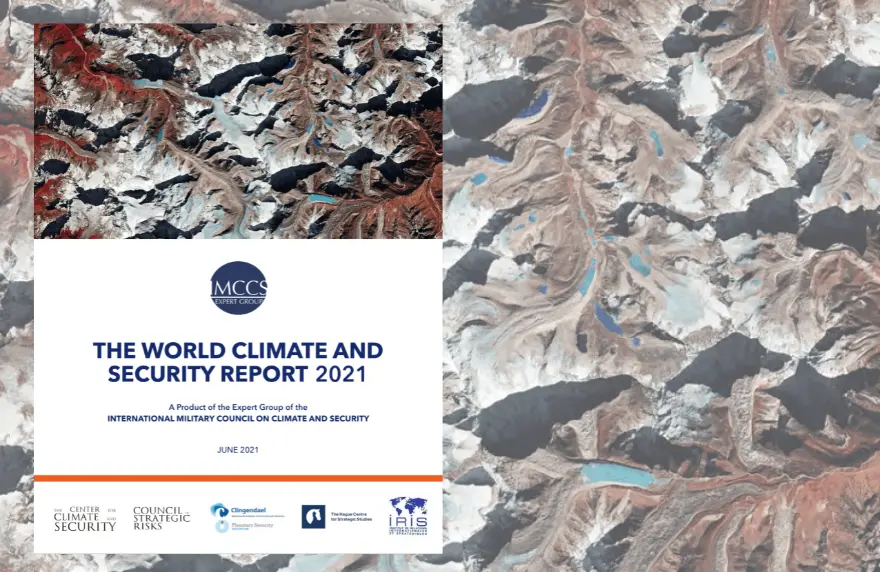Munich, Germany, February 13, 2020 — This year climate change is more central than ever at the Munich Security Conference (MSC), the leading international forum for senior military, security and foreign policy leaders. with the release of the inaugural “World Climate and Security Report 2020” by the Expert Group of the International Military Council on Climate and Security (IMCCS). The release will be announced by General (Ret) Tom Middendorp, Chair of the IMCCS, at the conference’s “Apocalypse Now? – Climate and Security” opening event at 16:15pm CET on February 13 (open to the public), followed by an MSC event on the report at 16:00pm CET on February 15 (open to registered MSC participants). The IMCCS is a group of senior military leaders, security experts, and security institutions across the globe – currently from 32 countries in every hemisphere – dedicated to anticipating, analyzing, and addressing the security risks of a changing climate.
The report finds that security and military experts are increasingly concerned about the security implications of climate change, with many perceiving the risks to global security to be significant or higher in the next two decades, and recommends “climate-proofing” international security – including infrastructure, institutions and policies, as well as major emissions reductions to avoid significant-to-catastrophic security threats.
In highlighting the key findings of the report, and the rationale for releasing it at the MSC, General Middendorp, former Chief of Defence of the Netherlands, stated:
“Climate change poses significant risks to global security, which could become catastrophic in the next two decades. As this report, and the 31-country International Military Council on Climate and Security shows, more and more military leaders are raising this alarm. It’s not just environmentalists. The security community therefore has a responsibility to prepare for and prevent these threats. That’s why we’ve brought the World Climate and Security Report to the Munich Security Conference.” – General (Ret) Tom Middendorp, Chair, IMCCS
The group’s Secretary General, the Honorable Sherri Goodman, former U.S. Deputy Undersecretary of Defense and now Senior Strategist at the Center for Climate and Security, stated:
“Major and urgent global emissions reductions are necessary in order to avoid significant, severe or catastrophic global security consequences in the future. That’s our judgment from a military perspective. For example, 93% of the climate security and military experts surveyed in our World Climate and Security Report assess that climate-driven water insecurity will pose a significant or higher risk to global security by 2030. That’s unacceptable, and the world’s security leaders must do as much as they can to avoid that future. We hope that the Munich Security Conference is the beginning of a major effort by the security community to address this global threat.” – The Honorable Sherri Goodman, Secretary General, IMCCS
Captain Steve Brock, U.S. Navy (Ret), Chief of Staff of the IMCCS and lead author on the report, highlighted that though militaries are raising the alarm, most of the solutions will be civilian:
“The security landscape is going to be disrupted significantly as a result of climate change. As military and security professionals, we are warning the public about this threat, But the solutions will mostly be civilian. That includes significant emissions reductions to avoid the worst effects of climate change, and investing heavily in the climate resilience of nations that need it in order to avoid instability, conflict and major humanitarian disasters.” – Captain Steve Brock, U.S. Navy (Ret), Chief of Staff, IMCCS
Caitin Werrell and Francesco Femia, Managers and Senior Advisors of the IMCCS, and Co-Founders of the Center for Climate and Security, noted that significant security risks will affect all regions of the globe, and not just the most vulnerable:
“All regions of the world are facing significant security risks from climate change – not just the poorest, as we’re seeing in Australia and around the world. Though fragile regions face the most severe consequences in the short term, these risks are global and interconnected. The World Climate and Security Report 2020 shows this clearly – from climate threats to military bases and critical infrastructure in North America and the Indo-Asia-Pacific, to climate-exacerbated political instability in the Middle East, North Africa, Latin America and even Europe, nobody gets to hide behind their gates to weather this storm. It’s hitting all of us.” – Caitin Werrell and Francesco Femia, Managers and Senior Advisors, IMCCS
Bastien Alex, Senior Member of the Executive Committee of the IMCCS, highlighted rising authoritarianism as an impediment to global cooperation on addressing the threat, while also calling for avoiding unintended security consequences with our responses.
“As the report notes, ‘rising authoritarianism, sharpened global competition and national agendas are hampering the needed cooperation among nations to address the security risks of climate change.’ But as we figure out what to do collectively to address this risk, we should be careful. Some proposed solutions, including geoengineering, could create disruptions to global security if not implemented carefully.” – Bastien Alex, Senior Member of the Executive Committee, IMCCS
Michel Rademaker, Senior Member of the Executive Committee of the IMCCS and author of the Climate Security Game Results chapter of the report, highlighted the foresight and preparedness opportunities that exist in the world of strategic gaming.
“When thinking about the possibilities to mitigate climate security risks it is important to understand that there are multiple ways of doing so. Through the Climate Security Strategic Capability game, we’ve identified more than 40 specific capabilities that can be utilized either independently or in tandem to help governments and militaries prepare for these myriad and complex risks. Gaming them is a useful way to create better awareness and understanding as well as helping prioritize what to do next!” – Michel Rademaker, Senior Member of the Executive Committee, IMCCS.
While there has been a lot of progress over the past decades, with militaries and security institutions increasingly analyzing and incorporating climate change risks into their assessments, plans, and policies, the “World Climate and Security Report 2020” shows that the risks are increasingly urgent, and more must be done. This contributed to the report’s “Key Risks and Opportunities” findings, which headline the publication and are included below.
Key Risks: Significant or higher risks to global security under current circumstances
- Water insecurity a global security risk: Climate change-exacerbated water insecurity is already a significant driver of instability, and according to 93% of climate security and military experts surveyed for this report, will pose a significant or higher risk to global security by 2030.
- All regions facing increase in climate security risks (not just fragile/poor): Though fragile regions of the world are facing the most severe and catastrophic security consequences of climate change, all regions are facing significant or higher security risks due to the global nature of the risks. For example, 86% of climate security and military experts surveyed for this report perceive climate change effects on conflict within nations to present a significant or higher risk to global security in the next two decades.
- Military institutions are increasingly concerned about climate risks: As reinforced by the 31 nations represented in the International Military Council on Climate and Security (IMCCS), an increasing number of national, regional and international security and military institutions are concerned about, and planning for, climate change risks to military infrastructure, force readiness, military operations, and the broader security environment.
- Climate mitigation, adaptation and resilience efforts are increasingly urgent to avert the significant security consequences of climate change, yet some proposed solutions such as geoengineering could present negative second-order effects to global security, if not implemented carefully.
- Rising authoritarianism, sharpened global competition and national agendas are hampering the needed cooperation among nations to address the security risks of climate change.
Key Opportunities: A path forward for global security cooperation on climate change
- National, regional, and international security institutions and militaries around the world should advance robust climate resilience strategies, plans and investments, especially regarding climate implications for water and food security and their associated effects on stability, conflict and displacement, in their primary mission sets or lines of effort.
- Security and military institutions should demonstrate leadership on climate security risks and resilience and encourage governments to advance comprehensive emissions reductions and adaptation investments to avoid those security disruptions. Military organizations can also lead by example through taking advantage of the significant opportunities to adopt lower carbon energy sources, and make progress on other greenhouse gases beyond carbon dioxide.
- Climate-proofing development assistance for vulnerable nations which are likely hotspots of instability and conflict, as well as climate-proofing other policies affecting those regions, should be a priority for conflict prevention. Assistance should be aimed at climate resilience challenges such as water security, food security, and disaster preparedness.
- The international community should embrace a Responsibility to Prepare and Prevent framework, given unprecedented foresight capabilities regarding the unprecedented risks of climate change. This includes ensuring all levels of government and civil society, including all national, regional and international security institutions, are prepared for the security implications of climate change.
- Security institutions around the globe should integrate climate knowledge and training into institutional frameworks to ensure that knowledge and understanding of climate change threats permeates the organizational culture. For example, climate security curricula should be added to national and regional training and defense colleges, professional military education, and climate security should receive significant treatment in international security and military fora.
Read the World Climate and Security Report 2020: at the IMCCS website or here
Direct inquiries to: Francesco Femia, ffemia@csrisks.org, What’sApp: +1-571-263-5691
Find details of the report release at the Munich Security Conference: here
###
Who: The International Military Council on Climate and Security (IMCCS) is a group of senior military leaders, security experts, and security institutions across the globe, currently representing 31 countries, dedicated to anticipating, analyzing, and addressing the security risks of a changing climate. The group was founded and is administered by the Center for Climate and Security (CCS), an institute of the Council on Strategic Risks (CSR), in partnership with the French Institute for International and Strategic Affairs (IRIS), the Hague Centre for Strategic Studies (HCSS) and the Planetary Security Initiative of the Netherlands Institute of International Relations (Clingendael). These organizations form the Expert Group of the IMCCS.






